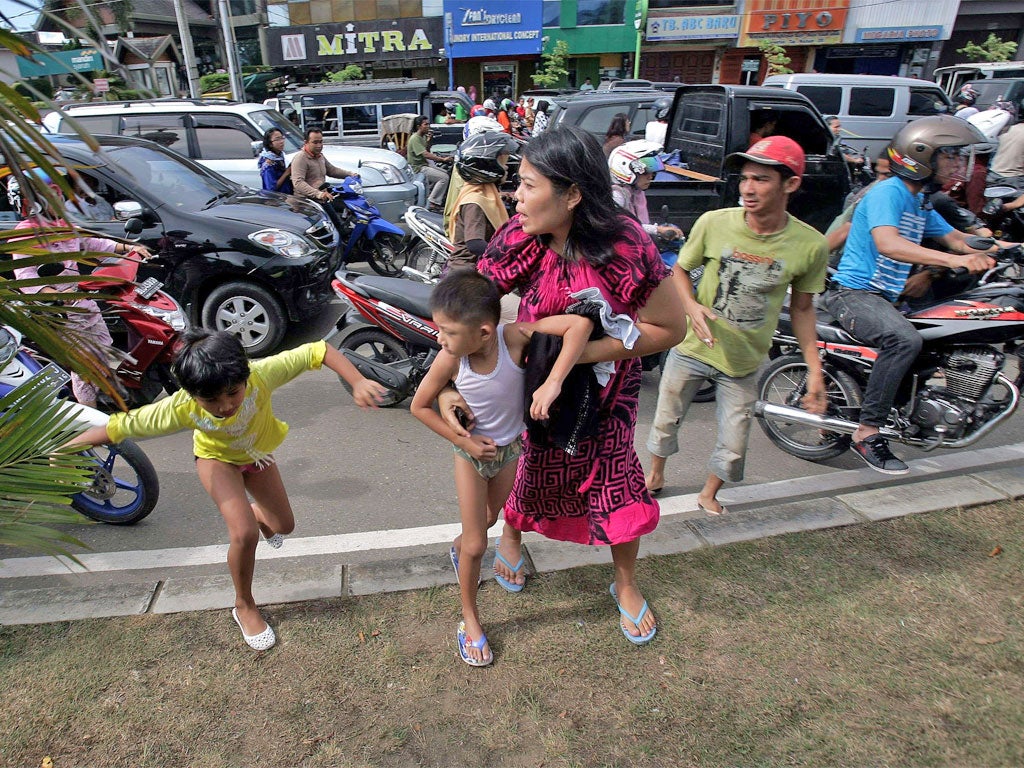Spectre of Boxing Day tsunami returns to terrify Indonesia
Evacuations after massive earthquakes off coast of Sumatra – but region escapes repeat of disaster

Your support helps us to tell the story
From reproductive rights to climate change to Big Tech, The Independent is on the ground when the story is developing. Whether it's investigating the financials of Elon Musk's pro-Trump PAC or producing our latest documentary, 'The A Word', which shines a light on the American women fighting for reproductive rights, we know how important it is to parse out the facts from the messaging.
At such a critical moment in US history, we need reporters on the ground. Your donation allows us to keep sending journalists to speak to both sides of the story.
The Independent is trusted by Americans across the entire political spectrum. And unlike many other quality news outlets, we choose not to lock Americans out of our reporting and analysis with paywalls. We believe quality journalism should be available to everyone, paid for by those who can afford it.
Your support makes all the difference.When the ground began to shake violently at 3.38pm, residents of Indonesia's Aceh province panicked. They feared a repetition of the dreadful events of Boxing Day 2004, when a 9.1-magnitude earthquake triggered huge waves that killed 230,000 people in countries bordering the Indian Ocean.
Yesterday's 8.6 quake, which was felt as far away as southern India and sent terrified Acehnese fleeing to high ground in cars and on motorbikes, was followed by an aftershock measuring 8.2. But although the epicentre of the tremors – about 300 miles off the west coast of Sumatra – was similar to 2004, they were geologically different, and an Indian Ocean-wide tsunami alert was lifted four hours after the first quake.
Warnings had been issued in India, Sri Lanka, Thailand, Tanzania and Kenya, as well as Indonesia. On Phuket, the Thai island badly hit by the 2004 tsunami, tourists from expensive resorts were evacuated to hills behind the coast, and the airport was shut. In Aceh, where 170,000 people died in 2004, residents poured out of their homes after the first quake and searched frantically for family members. Sea levels rose, however, by barely 3ft. The aftershock came just over two hours later. A second tsunami warning was issued, but once again the threat passed quickly. Two more powerful aftershocks followed.
The quakes took place as David Cameron was visiting Jakarta on the latest leg of his four-day Asian tour. The Prime Minister appeared at a press conference with the Indonesian President, Susilo Bambang Yudhoyono, who had ordered a disaster relief team to fly to Aceh. Mr Cameron said Britain stood ready to help if needed.
Alarming as it was, the incident showed the effectiveness of warning systems set up since 2004. Tsunami alerts were issued not only by the Pacific Tsunami Warning Centre in Hawaii, but by Indonesia's geophysics agency, Thailand's National Disaster Warning Centre, India's Tsunami Warning Centre and the Sri Lankan authorities.
In Tamil Nadu, southern India, police cordoned off beaches and used loudspeakers to warn people to leave. Geologists said the quakes caused no casualties or serious damage, even in Aceh, and did not spark a tsunami because the ground shifted horizontally, with tectonic plates sliding against each other. In 2004, by contrast, and off Japan last year, water was displaced vertically, sending towering waves racing towards the shore.
Nonetheless, the latest tremors caused widespread alarm, sending office workers scurrying from buildings in Colombo, the Sri Lankan capital, and Bangalore, in southern India. The port of Chennai was closed. Officials in the Andaman and Nicobar islands, also badly affected in 2004, warned that waves of up to 13ft could hit the coast.
The first quake occurred at a depth of 20.5 miles. In devoutly Muslim Aceh, the power went off and sirens wailed. As traffic jams built up, people gathered in mosques, where religious leaders recited the Koran. In the city of Medan, hospital patients were wheeled out on beds and in wheelchairs.
High-rise buildings shook in neighbouring Malaysia, while Singapore and Bangladesh were also rattled. In Phuket, "everyone was quite calm", said a freelance journalist, Apichai Thonoy, who told Reuters that the warning was "issued well in advance".
Join our commenting forum
Join thought-provoking conversations, follow other Independent readers and see their replies
Comments